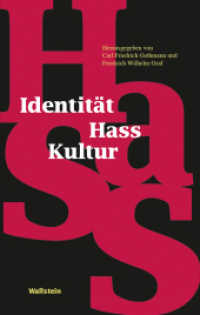- ホーム
- > 洋書
- > 英文書
- > Politics / International Relations
Full Description
In writing about international affairs in the 1960s, historians have naturally focused on the Cold War. The decade featured perilous confrontations between the United States and the Soviet Union over Berlin and Cuba, the massive buildup of nuclear stockpiles, the escalation of war in Vietnam, and bitter East-West rivalry throughout the developing world. As the world historical force of globalization has quickened and deepened, however, historians have begun to see that many of the global challenges that we face todayinequality, terrorism, demographic instability, energy dependence, epidemic disease, massive increases in trade and monetary flows, to name just a few examples asserted themselves powerfully during the decade.
Beyond the Cold War examines how the administration of President Lyndon B. Johnson responded to this changing international landscape. To what extent did U.S. leaders understand these changes? How did they prioritize these issues alongside the geostrategic concerns that dominated their daily agendas and the headlines of the day? How successfully did Americans grapple with these long-range problems, with what implications for the future? What lessons lie in the efforts of Johnson and his aides to cope with a new and inchoate agenda of problems? By reconsidering the 1960s, this work suggests a new research agenda predicated on the idea that the Cold War was not the only or perhaps even the most important feature of international life in the postwar period.
Contents
Acknowledgments ; Contributors ; Introduction, Francis J. Gavin and Mark Atwood Lawrence ; Part I: Thinking Beyond East and West ; 1. Lyndon Johnson and the Challenges of Economic Globalization, Daniel Sargent ; 2. Toward a New Deal for the World? Lyndon Johnson's Aspirations to Renew the Twentieth Century's Pax Americana, Patrick O. Cohrs ; 3. Moving Beyond the Cold War: The Johnson Administration, Bridge-Building, and Detente, Thomas A. Schwartz ; Part II: Internationalizing the Great Society ; 4. One Global War on Poverty: The Johnson Administration Fights Poverty at Home and Abroad, 1964-1968, Sheyda Jahanbani ; 5. LBJ's Third War: The War on Hunger, Nick Cullather ; 6. LBJ and World Population: Planning the Greater Society One Family at a Time, Matthew Connelly ; 7. Globalizing the Great Society: Lyndon Johnson and the Pursuit of Smallpox Eradication, Erez Manela ; Part III: Adapting to a World of Scarcity ; 8. Thinking Globally: U.S. Foreign Aid, Paul Ehrlich, and the Emergence of Environmentalism in the 1960s, Tom Robertson ; 9. "More a Gun at Our Heads than Theirs": The 1967 Arab Oil Embargo, Third World Raw Materials Sovereignty, and American Diplomacy, Christopher R.W. Dietrich ; Part IV: Shifting Moralities ; 10. The Rise of Human Rights during the Johnson Years, Sarah B. Snyder ; 11. Globalized Faith, Radicalized Religion, and the Domestic Sources of U.S. Foreign Policy, Andrew Preston







